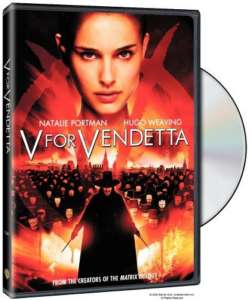| "Remember, remember the fifth of November," for on this day, in 2020, the minds of the masses shall be set free. So says code-name V (Hugo Weaving), a man on a mission to shake society out of its blank complacent stares in the film V For Vendetta. His tactics, however, are a bit revolutionary to say the least. The world in which V lives is very similar to Orwell's totalitarian dystopia in 1984: after years of various wars, England is now under "big brother" Chancellor Adam Sutler (played by John Hurt, who ironically played Winston Smith in the movie 1984) whose party uses force and fear to run the nation. After gaining power, minorities and political dissenters were rounded up and removed; artistic and unacceptable religious works were confiscated. Cameras and microphones are littered throughout the land, and the people are perpetually sedated through the governmentally controlled media. Taking inspiration from Guy Fawkes, the 17th century co-conspirator of a failed attempt to blow up Parliament on November 5, 1605, V dons a Fawkes mask and costume and sets off to wake the masses by destroying the symbols of their oppressors, literally and figuratively. At the beginning of his vendetta, V rescues Evey (Natalie Portman) from a group of police officers and has her live with him in his underworld lair. It is through their relationship where we learn how V became V, the extremities of the party's corruption, the problems of an oppressive government, V's revenge plot and his philosophy on how to induce change. Based on the popular graphic novel by Alan Moore, V For Vendetta's screenplay was written by the Wachowski Brothers (of The Matrix fame) and directed by their protégé James McTeigue. Controversy and criticism followed the film since its inception, from the hyper-stylized use of anarchistic terrorism to overthrow a corrupt government and the blatant jabs at the current US political arena, to graphic novel fans complaining about the reconstruction of Alan Moore's original vision (Moore himself has dismissed the film). Many are valid critiques and opinions, but there's no hiding the message the film is trying to express: Radical and drastic events often need to occur in order to shake people out of their state of indifference in order to bring about real change. Unfortunately, the movie only offers a means with no ends, and those looking for answers may find the film stylish, but a bit empty. --Rob Bracco |

